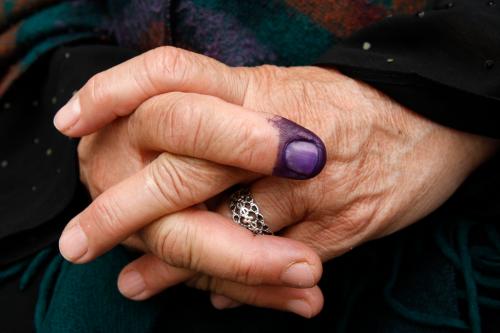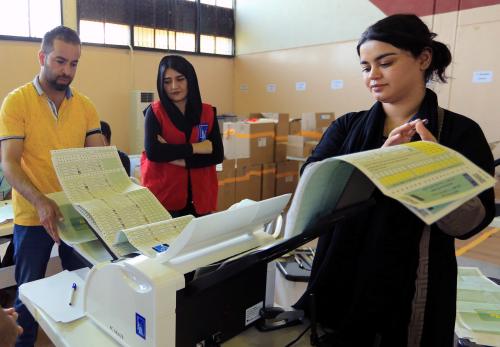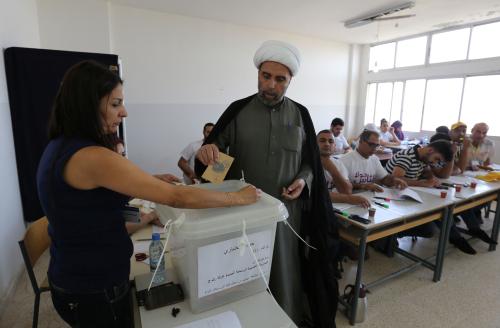Yesterday afternoon, I testified before the House Foreign Affairs Subcommittee on Middle East and North Africa about recent elections in Iraq and Lebanon. My full testimony is available here; below are some highlights. Video of the hearing, which also included colleagues Danielle Pletka of the American Enterprise Institute and Michael Doran of the Hudson Institute, is available here.
The elections in Iraq and Lebanon earlier this month present a fragile but important counterpoint to a region in turmoil. Extremists claim that only violence can bring change; these elections promise another path. And when Lebanon and Iraq pull off free elections under such trying circumstances, it’s harder for strongmen in other Arab states to argue that they can’t afford the risk to stability of allowing their own peoples a choice in who governs them.
Political outcomes and the balance of power
The political outcomes in these two countries offer both risks and opportunities for American policy, and we must be wary of drawing strong conclusions from ambiguous results. That said, there are some developments worth noting and nurturing in both Iraq and Lebanon.
- In both Iraq and Lebanon, elections yielded lower turnout than in past years—49 percent in Lebanon and just 44 percent in Iraq. Both those who voted and those who stayed home expressed impatience with established political movements more interested in dividing the spoils of government than in actually governing.
- In both places, security gains have increased citizens’ appetite for pragmatic policies that deliver on their core needs.
- In both countries, the military and security services are relatively trusted national institutions, and nationalism is growing relative to sectarianism.
These trends present opportunities for new moderating political forces to emerge—but also present the risk that, if citizens’ needs aren’t addressed, they might simply give up on electoral politics and on the government itself as a source of solutions to their day-to-day problems. Extremists could exploit this frustration. The United States has a stake in supporting healthy political competition.
- In neither country did the electoral outcome significantly shift the balance of power between Iran’s allies and its adversaries. The battle to contain and push back Iranian influence is not lost, but neither is it over.
- In Iraq, the process of government formation will be more important to determining Iran’s role than the election itself was. While the United States cannot determine the outcome of Iraq’s government negotiations, it does have influence—especially working in concert with Gulf Arab states who have assiduously courted incumbent Prime Minister Haider al-Abadi, Ayatollah Ali al-Sistani, and Muqtada al-Sadr, leader of the victorious Sairoon electoral list, in the past months, hoping to gain from closer economic ties to Iraq. A wise posture for the U.S. government would be to stay engaged and make clear the principles it expects a new government to uphold, including continued counterterrorism efforts and security cooperation with Washington, maintaining Iraq’s neutrality in regional conflicts, resolving conflicts with the Kurdish region, and advancing reforms to boost the economy. Further, the United States should work with Arab partners to advance the vision of a sovereign Iraq integrated within the Arab world.
- In Lebanon, it’s not quite right to say that Hezbollah “won” these elections. In fact, it “won” the political game back in October 2016 when Saad Hariri cut a deal with Hezbollah to return as prime minister a few months after Saudi Arabia cut off aid to the Lebanese government and abandoned him. That deal seems to hold in the wake of the elections. That said, the old coalitions are fracturing, new independent politicians are emerging, and there is movement in the Christian parties.
The failure of Saudi Arabia’s “my way or the highway” approach to Lebanon in 2016 and 2017 should be instructive for us now—walking away from the table is a good way to ensure you lose the game. To curtail Iranian influence and advance our own interests in stability and counterterrorism, the United States needs to stay engaged in Iraq and Lebanon, using diplomatic and economic tools, and working together with regional partners who share our goals of promoting stability and tempering Iran’s influence.
We can encourage sovereignty and independence amidst the region’s swirling conflicts, maintain security cooperation, support local democratic development, and nurture political shifts away from sectarianism and toward more effective and responsive governance.
The greatest risk for American policy toward Lebanon and Iraq right now would be to embark on blunt-force policies, either by walking away from the fight or by squeezing these fragile countries into unwelcome crisis. Such tactics would give away American influence, advantaging Iran further across the region.
Regional politics and Trump’s Iran policy
Secretary of State Mike Pompeo’s speech Monday laid out a list of desiderata for changed Iranian policies that I think we can all agree are worthy goals—but a strategy links goals to means, and his speech did not specify any realistic path by which the United States can achieve what it seeks.
The Trump administration’s declaration of maximum pressure on Iran will likely be immediately tested by the Iranian Revolutionary Guard Corps (IRGC) ratcheting up conflict in existing areas of tension around the region. Sanctions have not historically done much to constrain the IRGC’s regional activities; they will not likely do much this time either.
What troubles me is that, at this same moment, the Trump administration is looking to walk away from key arenas in Syria, abandoning local allies and freeing up space for both Iranian proxies and Sunni extremists, who feed off of one another.
It is hard to understand the recent White House decisions to withdraw our special forces fighting ISIS, freeze $200 million in pledged reconstruction assistance, or cut aid to areas in Idlib province freed from ISIS rule.
President Trump’s determination to neglect our hard-won gains in Syria risks the resurgence of ISIS, cuts directly against the U.S. ability to shape the ongoing competition for influence against Iran, and weakens our ability to support our partners in protecting their own security against Iranian depredations.
A more comprehensive and realistic strategy would be a long-term investment in diplomatic, economic, military, and intelligence tools. Made in partnership with our friends in the region and around the world, such an investment would seek to interrupt and expose Iran’s activities and to close down their space for maneuver—starting with ending the civil war in Yemen. Sadly, I see no sign of such a strategy on the horizon.






Commentary
Elections in Lebanon and Iraq offer a glimmer of hope—how the US should prepare for the long term
May 23, 2018